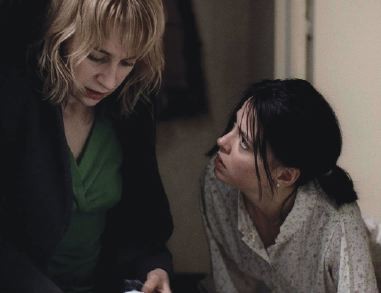Four Months, Three Weeks and Two Days

Part of what makes Romanian director Cristian Mungiu’s Four Months, Three Weeks and Two Days so fascinating is its rambling, almost improvisational style. Viewers have to pick up bits of information about the plot and characters along the way.
The film, which won the Palme d’Or at the 2007 Cannes Film Festival (while being ignored by the Academy Awards), starts with a mesmerizing sequence of what appears to be a typical morning in a women’s dormitory at a working-class technical school. The girls are scurrying around, washing up, getting dressed and searching for lost items. At first, we’re not sure if we’re in a dorm or a prison. Not only are the surroundings stripped down and stark (like the movie itself), but a massive amount of low-end bartering is taking place, with chocolates and cigarettes (especially the highly valuable Kents) being traded for soap and shampoo.
In the midst of this controlled chaos we meet Gabita (Laura Vasiliu) and Otilia (Anamaria Marinca), the two principals in what turns out to be a morality play about a black-market abortion in Romania in the late 1980s, the final years of the Ceausescu-led communist regime. The vital facts are parsed out stingily. We discover that Gabita is pregnant, that Otilia is going to spend the day helping her out, and that they are going somewhere that has been recommended by a mutual friend. But we don’t know anything about the man who got Gabita pregnant, where they got the money for the abortion, or even what the girls’ relationship is.
The tension is increased by the knowledge that under Ceausescu abortion was illegal and punishable by a stiff jail sentence. (The punishment could be worse for doctors or back-alley abortionists who got caught.) More than half a million women died from botched abortions during this period.
The drama succeeds on myriad levels, starting with the chronicling of the bureaucratic web that the women must fight through during their 24-hour journey. Besides dealing with the usual issues of money and trust, the women face confrontations and disagreements with phone operators, bus drivers, desk clerks and security guards, all of whom are looking to ease their hatred of their jobs by making life difficult for someone else.
These indignities and betrayals are just a warm-up, however, for the pair’s meeting with the loathsome Mr. Bebe (Romanian stage veteran Vlad Ivanov, in an amazing performance), an abortionist whose shabby treatment of terrified young women seems to mirror the government’s cavalier attitude toward who lives and who dies. (Some critics think Four Months is less about abortion than about the futility of rebellion against the state.) The filmmakers juxtapose this treatment with the scene of a fancy dinner party that Otilia attends to please her upper-class boyfriend. It is a masterfully directed scene, reminiscent of Hitchcock, with all sorts of comments and asides (and the ringing of an off-screen phone) that make the palpable tension even more difficult to bear.
The highlight of this challenging film is Marinca’s performance as Otilia as she not only navigates the down-and-dirty world of hotel lobbies, bus stations and dangerous neighborhoods, but makes every difficult decision, knowing that one lazy move or absentminded slip could lead to the loss of her education or to a severe jail term or even death. The strength that she exhibits while seeking to remain the most loyal of friends is profound.





